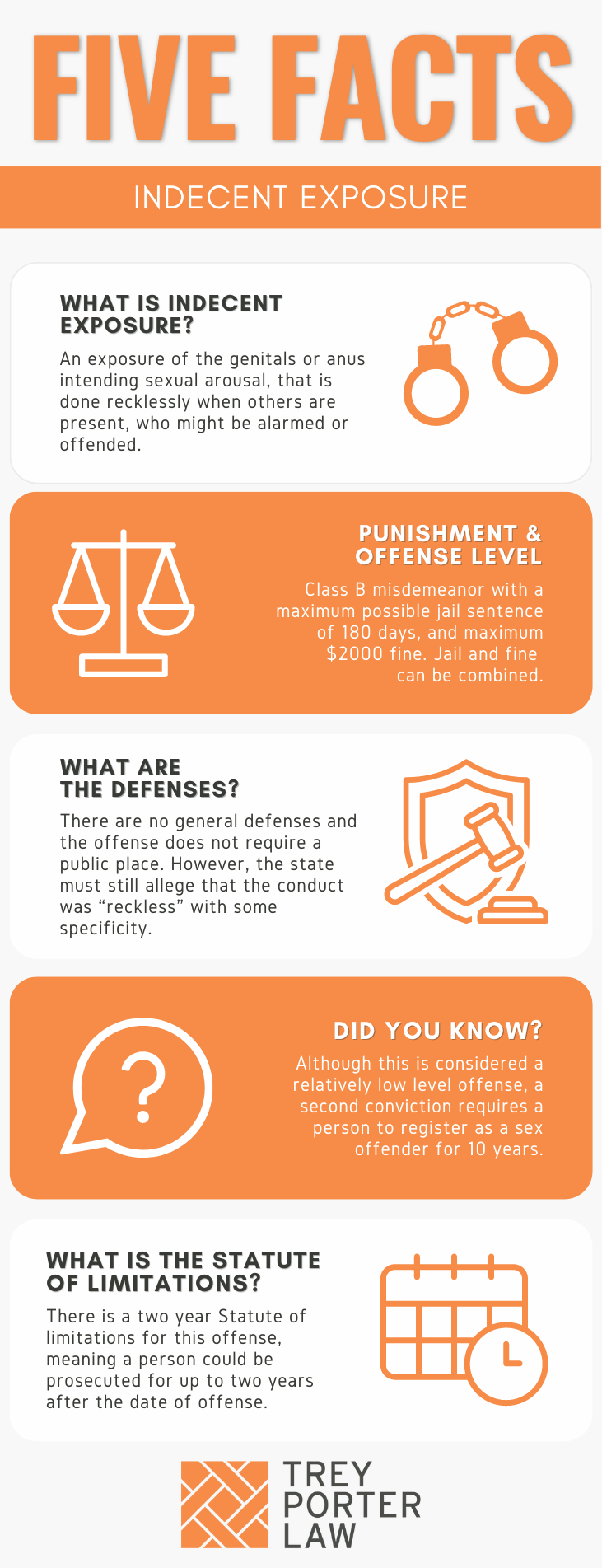WHAT IS INDECENT EXPOSURE IN TEXAS?
A person commits indecent exposure by showing another his or her genitals or anus, or recklessly displaying his or her genitals or anus in a place where someone would be offended. Masturbating in public is a common example of indecent exposure.

WHAT IS THE INDECENT EXPOSURE LAW IN TEXAS?
Tex. Penal Code § 21.08. INDECENT EXPOSURE.
(a) A person commits an offense if he exposes his anus or any part of his genitals with intent to arouse or gratify the sexual desire of any person, and he is reckless about whether another is present who will be offended or alarmed by his act.
(b) An offense under this section is a Class B misdemeanor.
WHAT IS THE PENALTY CLASS FOR INDECENT EXPOSURE IN TEXAS?
Indecent exposure is a Class B misdemeanor, punishable by up to 180 days in county jail.
WHAT IS THE PUNISHMENT RANGE FOR INDECENT EXPOSURE IN TEXAS?
The punishment range for indecent exposure, a Class B misdemeanor, is up to 180 days in jail, and up to a $2,000 fine.
WHAT ARE THE PENALTIES FOR INDECENT EXPOSURE IN TEXAS?
As an alternative to jail time, a person may be convicted and placed on probation for up to two years, or avoid a conviction and be placed on deferred adjudication for up to two years.
- Does an indecent exposure conviction require registration as a sex offender? A second conviction for indecent exposure requires sex offender registration. However, if the person is placed on deferred adjudication for their second offense, it is not a reportable conviction or adjudication that requires a person to register as a sex offender.
WHAT ARE THE DEFENSES TO INDECENT EXPOSURE IN TEXAS?
A person accused of indecent exposure may attempt to negate one of the elements the State must prove at trial. Typically, the easiest element to argue against is the allegation that the person was reckless about whether another person was present who would be offended and alarmed by the act.
- What if the exposure was in a private place? There is no requirement that indecent exposure be committed in public. The prosecution must prove that a person accused of indecent exposure was reckless about whether anyone else was around who would be offended or alarmed by the exposure. This requires specifically alleging the acts that were reckless.
- What does it mean to be reckless about whether another person is present? In McCoslin v. State, a defendant staying in a hotel requested room service. He left the door slightly open, and invited the victim inside after she knocked. The defendant was on the bed under the comforter, and when the victim set the food on his nightstand, he removed the comforter to expose his penis while masturbating.The State alleged in its information that the defendant was reckless about another’s presence “in that he left his hotel room door ajar and requested the complainant enter the room.” The court held this was specific enough. McCoslin v. State, 558 S.W.3d 816 (Tex. App.—Houston [14th Dist.] 2018, pet. ref’d).
- What is the intent to arouse or gratify the sexual desire of any person? The “intent to arouse or gratify the sexual desire of any person,” including the accused, is a requirement for indecent exposure charges. In masturbation cases, it is not difficult for a jury to infer that the defendant’s intent was to gratify his sexual desire. But in flashing cases, for example, sexual gratification is not always a foregone conclusion. It may be proved by additional circumstances.
WHAT IS THE STATUTE OF LIMITATIONS FOR INDECENT EXPOSURE IN TEXAS?
The limitation period for indecent exposure, a Class B misdemeanor, is two years.
INDECENT EXPOSURE IN TEXAS
The indecent exposure statute prohibits intentional or reckless exposure of one’s anus or genitals to a person who would be offended or alarmed. The defendant need not know another person is present—if he exposes himself where others are likely to be present, even if no one actually sees anything, he may be charged with a crime.
TEXAS INDECENT EXPOSURE COURT CASES
The case law regarding indecent exposure in Texas shows that courts generally affirm convictions if the person exposed himself in a public place. However, the State must allege specific acts of recklessness if the exposure was in private.
- In Smith v. State, the prosecution alleged that the defendant exposed his genitals to an undercover police officer, and was reckless about whether another was present who would be offended and alarmed by the act because he “exposed his penis and masturbated.” While the offense did occur in a park, that was not alleged in the charge. The Court of Criminal Appeals held the information failed to specify an act constituting recklessness because there is nothing inherently reckless, without more, about exposing one’s penis and masturbating. Smith v. State, 309 S.W.3d 10 (Tex. Crim. App. 2010).
- In State v. York, by contrast, the defendant was charged with indecent exposure, with the alleged act of recklessness “expos[ing] his penis while at a public park.” The appellate court affirmed the conviction, noting the defendant’s exposure of “his penis at a public park” showed he was “aware of the risk that another person was present who would be offended . . . and that he acted in conscious disregard of that risk.” The court further held, “as a matter of law, the charging instruments alleged with reasonable certainty the acts relied upon to constitute recklessness” State v. York, 31 S.W.3d 798 (Tex. App.—Dallas 2000, pet. ref’d).
















